Sorry For My Behavior Letter
Subject: Apology for My Behavior
Dear [Recipient's Name],
I hope this letter finds you in good health and high spirits. I am writing to express my sincerest apologies for my behavior and actions during our recent interactions. I deeply regret my conduct and want to take full responsibility for my words and actions, as they were inappropriate and hurtful.
I realize that my behavior was disrespectful and not in line with the values and principles I hold dear. There are no excuses for my actions, and I understand the hurt and disappointment I may have caused you. Please know that I am deeply ashamed of my behavior and the impact it had on you and our relationship.
I want to assure you that I am committed to working on myself and improving as a person. Recognizing my mistakes has been a humbling experience, and I am determined to make amends. I am taking steps to address the underlying issues that led to my inappropriate behavior and am seeking guidance and support to become a better version of myself.
I understand if you need time and space to process what happened. I genuinely hope that, in time, you can find it in your heart to forgive me. I promise that I will do everything in my power not to repeat these mistakes and to demonstrate through my actions that I have changed.
If you are open to it, I would welcome an opportunity to discuss the matter further, to listen to your feelings, and to apologize in person. However, I also respect your wishes if you would prefer to maintain distance at this time.
Once again, I apologize wholeheartedly for my behavior. I value our relationship and deeply regret jeopardizing it. Please know that I am committed to learning from this experience and becoming a better, more understanding, and compassionate person.
Thank you for taking the time to read this letter. I hope that we can find a way to move forward, and I promise to do my best to regain your trust and respect.
With deepest regrets and apologies,
[Your Name]
Formal Apology Letter for Unprofessional Behavior
Subject: Apology for My Behavior
Dear [Recipient Name],
I am writing to sincerely apologize for my behavior during [specific event/situation]. I recognize that my actions were inappropriate and unprofessional, and I take full responsibility for them.
I value our relationship and the trust we share, and I am committed to ensuring such behavior does not happen again. I hope you can accept my sincere apology.
Sincerely,
[Your Name]
[Position, if applicable]
Heartfelt Personal Apology Letter
Subject: I Am Truly Sorry
Dear [Recipient Name],
I want to express my deepest apologies for my behavior on [specific day/event]. I understand that my actions caused hurt and discomfort, and I deeply regret it.
Please know that it was never my intention to hurt you, and I am committed to improving myself. I hope you can find it in your heart to forgive me.
Warm regards,
[Your Name]
Quick Email Apology for Minor Misbehavior
Subject: Sorry for My Behavior
Hi [Recipient Name],
I realize I acted inappropriately during [situation]. I sincerely apologize and assure you it won't happen again.
Thank you for your understanding.
Best,
[Your Name]
Informal Apology Letter to a Friend
Subject: Sorry About My Behavior
Hey [Friend's Name],
I just wanted to say sorry for how I acted during [event/situation]. I realize I overreacted and it wasn’t fair to you.
I hope we can move past this, and I promise to be more thoughtful in the future.
Cheers,
[Your Name]
Serious Apology Letter for Workplace Incident
Subject: Apology for Recent Incident
Dear [Recipient Name/Manager],
I am writing to formally apologize for my behavior during [incident]. I understand the severity of my actions and the impact they may have had on the team and organization.
I am taking steps to ensure this does not occur again, including [training, counseling, reflection, etc.]. I sincerely hope you can accept my apology.
Sincerely,
[Your Name]
[Position]
Creative Apology Letter
Subject: A Heartfelt Sorry
Dear [Recipient Name],
I want to acknowledge that my behavior during [situation] was wrong. I recognize how it affected you and others, and I am genuinely sorry.
Moving forward, I aim to be more considerate and thoughtful. Thank you for your patience and understanding as I work on myself.
Sincerely,
[Your Name]
Apology Letter for Family Member
Subject: Sorry for My Behavior
Dear [Family Member Name],
I realize my behavior during [specific situation] hurt you and caused tension. I deeply regret my actions and want to make amends.
Please accept my apology. I value our relationship and hope we can move forward together.
Love,
[Your Name]
What is a 'Sorry For My Behavior' Letter and Why It Is Important
- A letter written to express remorse for inappropriate actions or words.
- Purpose: to acknowledge mistakes, repair relationships, and show accountability.
- Strengthens trust and communication by demonstrating sincerity.
Who Should Send a 'Sorry For My Behavior' Letter
- Anyone who has behaved in a way that caused harm, discomfort, or offense.
- Employees, friends, family members, or peers who recognize the impact of their actions.
- Individuals seeking to restore trust or mend relationships.
Whom Should This Apology Letter Be Addressed To
- Directly affected individual(s) by the behavior.
- Supervisors or managers in a professional setting.
- Friends, family, or peers in personal contexts.
When to Send a 'Sorry For My Behavior' Letter
- Immediately after recognizing harmful or inappropriate behavior.
- Following a conflict, disagreement, or emotional outburst.
- After professional incidents, workplace errors, or personal misunderstandings.
How to Write and Send a 'Sorry For My Behavior' Letter
- Begin with a clear acknowledgment of the behavior.
- State understanding of the impact and accept responsibility.
- Express genuine remorse and desire to improve.
- Offer steps for rectifying the situation if appropriate.
- Send via email, message, or printed letter depending on the context.
Formatting Guidelines for Apology Letters
- Tone: Sincere, polite, and appropriate to relationship.
- Length: One page maximum; concise and specific.
- Structure: Start with apology, explain the context, express remorse, propose corrective action, close respectfully.
- Mode: Digital or printed depending on urgency and recipient preference.
Requirements and Prerequisites Before Sending an Apology Letter
- Reflect on the behavior and understand its impact.
- Ensure clarity on what needs to be addressed.
- Prepare any steps or commitments for improvement.
- Avoid sending under anger or emotional stress.
Elements and Structure of a 'Sorry For My Behavior' Letter
- Subject Line: Clearly indicate it is an apology.
- Greeting: Appropriate to relationship.
- Acknowledgment: Specify the behavior or action being apologized for.
- Responsibility: Accept accountability without excuses.
- Expression of Remorse: Show sincere regret.
- Corrective Action: Optionally mention steps to prevent recurrence.
- Closing: Polite and respectful ending.
- Signature: Include name and relationship/context if necessary.
Common Mistakes to Avoid in Apology Letters
- Being vague or insincere.
- Blaming others or making excuses.
- Delaying the apology unnecessarily.
- Overcomplicating or being defensive.
- Failing to follow up on corrective actions promised.
After Sending the Apology Letter: Follow-Up Steps
- Ensure the recipient has received and read the letter.
- Observe behavior changes to demonstrate sincerity.
- Be patient and give the recipient time to respond.
- Offer to discuss the matter further if appropriate.
Tips and Best Practices for Writing an Apology Letter
- Be honest and specific about what you did wrong.
- Keep the tone empathetic and respectful.
- Avoid over-apologizing; one clear apology is enough.
- Use a format suitable for the relationship and situation.
- Reflect on lessons learned to prevent future occurrences.
FAQ About 'Sorry For My Behavior' Letters
- Q: Can an apology letter fix all types of conflicts?
A: It helps repair trust, but follow-up actions and behavior changes are also crucial. - Q: Should the letter be formal or informal?
A: Tone should match the relationship and context. - Q: How soon should I send an apology letter?
A: As soon as you have reflected and can write sincerely. - Q: Is email acceptable for personal apologies?
A: Yes, though personal face-to-face apologies are often more impactful.
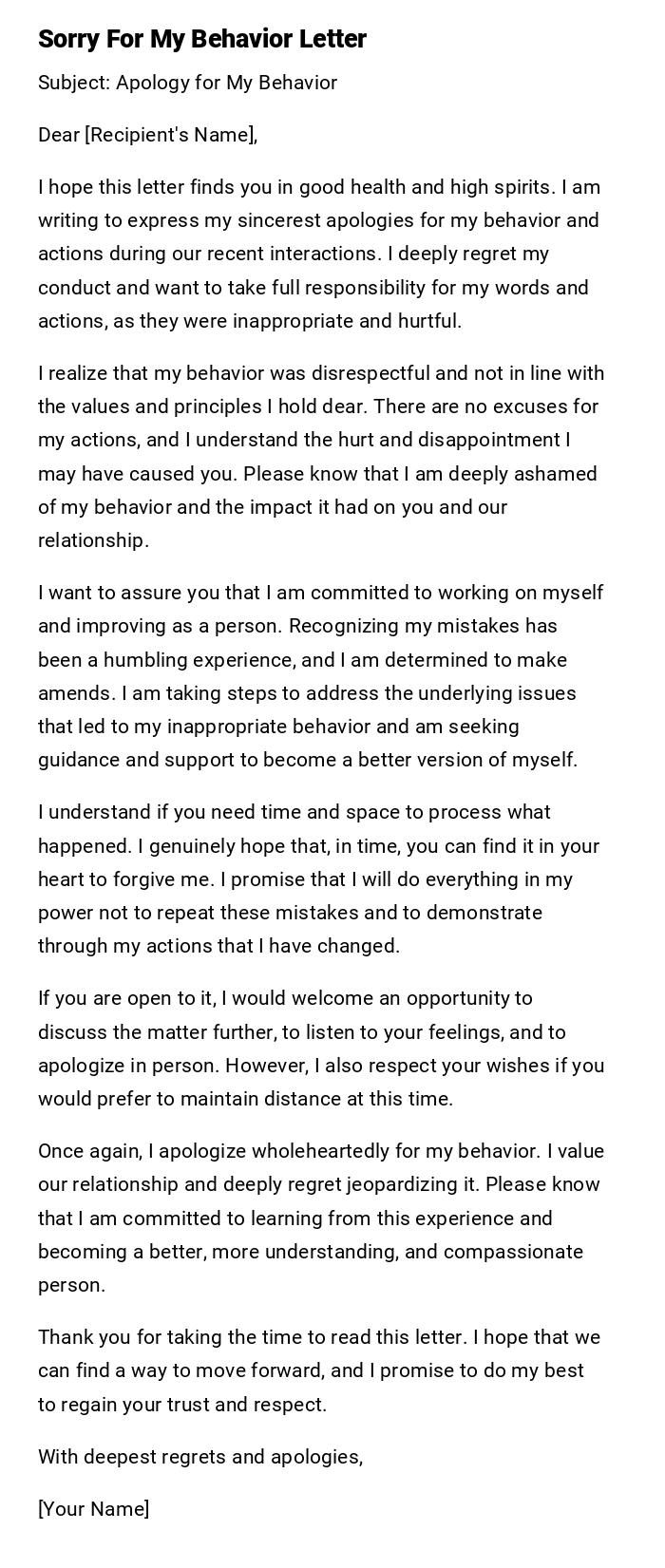

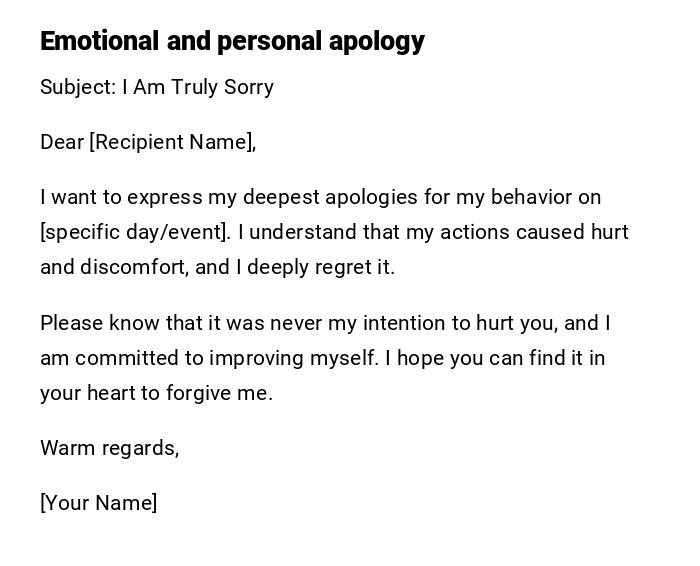

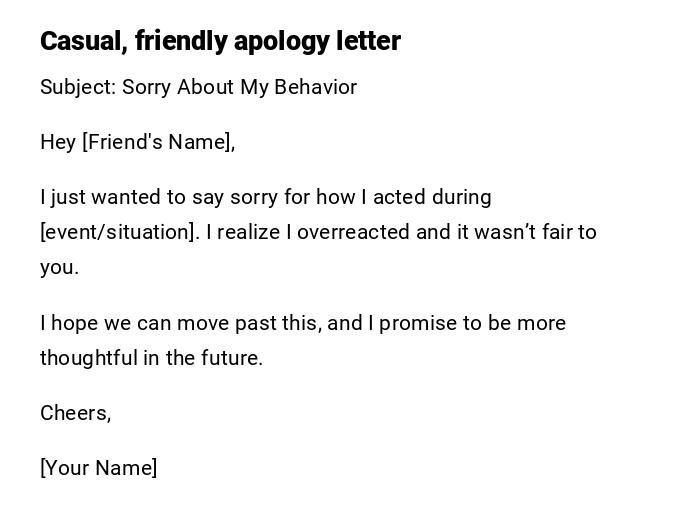
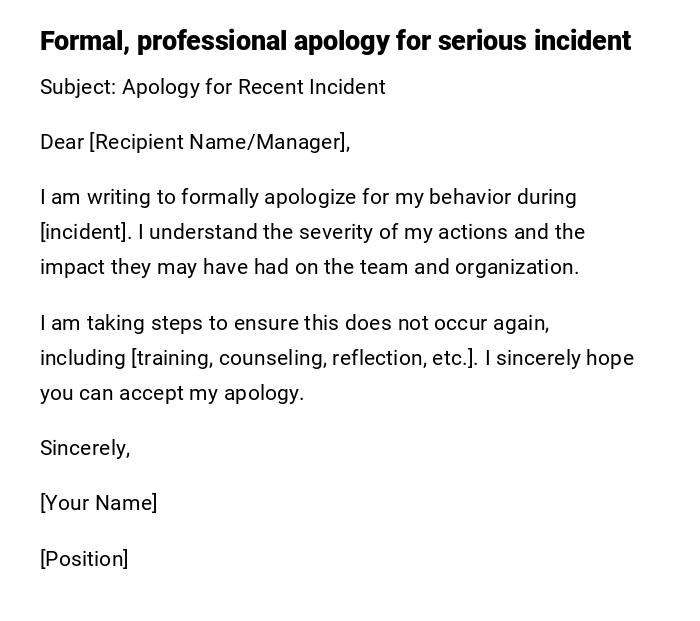
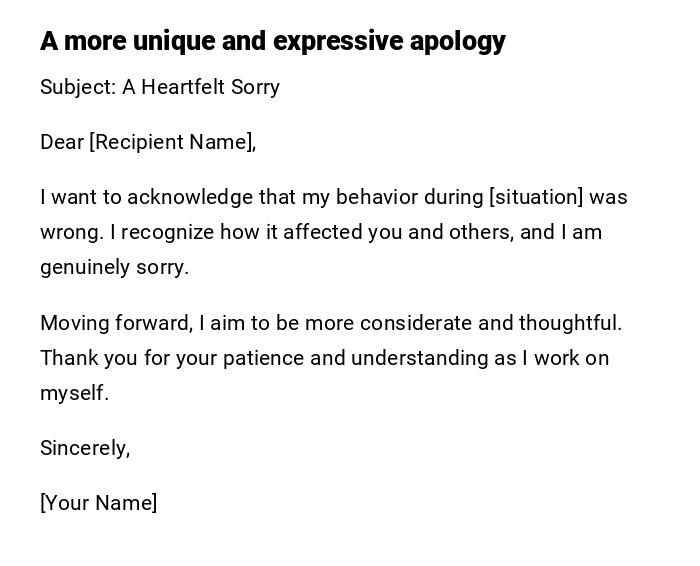
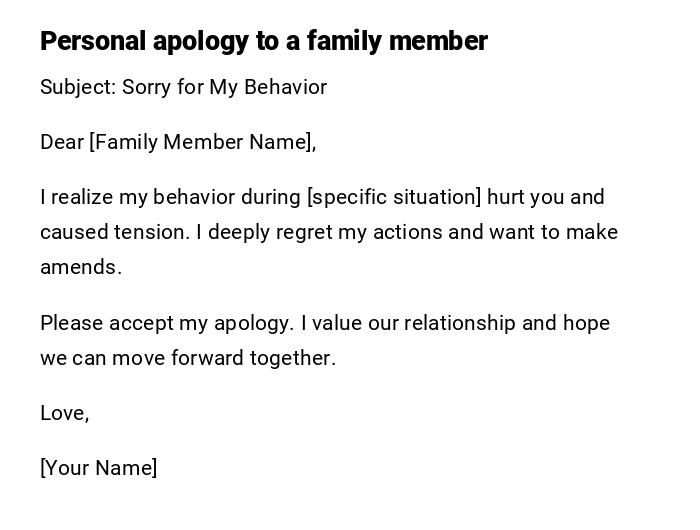

 Download Word Doc
Download Word Doc
 Download PDF
Download PDF